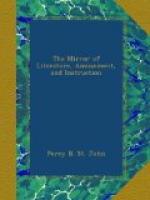The mind must be distracted with the multiplicity of its recollections; all that is great or good or glorious in our nature, must be identified with some forcible remembrance; and heroes, poets, statesmen, patriots, legislators, philosophers, and the historical events connected with their names, must congregate before us in sublime and touching similitude. “Alas, poor country!”—On those shores the monuments of science and of art, which drew admirers from the remotest corners of the earth, are now demolished by the savage and cowardly slaves of a despot, who is himself a slave; the eloquence which swayed the passions of applauding multitudes is dumb; the pencil of Appelles that breathed over the canvass, and the chisel of Praxiteles that gave life and animation to shapeless blocks, are now no more; and the all-powerful lyre, whose sweeping chords would rouse the soul to rage or melt it into pity, is now, and perhaps for ever, mute and unstrung!
These observations, which you may think too enthusiastic, were elicited by the perusal of an article in your No. 388, entitled “A Desultory Chapter on Localities.” Your Correspondent states, that “it is needless to travel to foreign countries in search of localities. In our own metropolis and its environs a diligent inquirer will find them at every step.” The following Collection will serve to confirm the truth of his statement, and should you deem it worthy “a local habitation” in your excellent journal, I doubt not it will prove interesting, if not quite new to many of your readers.[1]
[1] Is not this very interesting
extract by Leigh Hunt?—We have
not his Indicator at
hand for reference.
C.E.
“In St. Giles’ Church lie Chapman, the earliest and best translator of Homer; and Andrew Marvell, the wit and patriot, whose poverty Charles II. could not bribe.—Who would suppose that the Borough was the most classical ground in the metropolis? And yet it is undoubtedly so. The Globe Theatre was there, of which Shakspeare himself was a proprietor, and for which he wrote his plays. Globe-lane, in which it stood, is still extant, we believe, under that name. It is probable that he lived near it: it is certain that he must have been much there. It is also certain that on the Borough side of the river, then and still called the Bank-side, in the same lodging, having the same wardrobe, and some say, with other participations more remarkable, lived Beaumont and Fletcher. In the Borough, also, at St. Saviour’s, lie Fletcher and Massinger in one grave; in the same church, under a monument and effigy, lies Chaucer’s contemporary, Gower; and from an inn in the Borough, the existence of which is still boasted, and the site pointed out by a picture and inscription, Chaucer set out his pilgrims and himself on their famous road to Canterbury.




